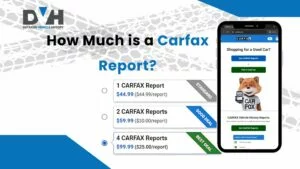Selling a car without a title is very hectic – and oftentimes suspicious. As a seller, you should usually have the title as it shows ownership of your vehicles. But if the title goes missing or is damaged, you have no other choice.
On these occasions, buyers will question the legitimacy of your ownership. After all, there’s no telling if you want to sell your car as a stolen vehicle, complicating the whole car-selling process.
Well, this article aims to show you how you can sell a car without a title and some alternatives to car titles you can use for a sale without any trouble.
What is a Car Title?
A car title is a legal document that proves ownership of a vehicle. It is issued by a state agency, usually the Department of Motor Vehicles (DMV) or Department of Transportation (DOT), during the initial registration of a vehicle.
The title doesn’t just show ownership but holds a lot of important information, including the vehicle identification number (VIN), make and model, odometer reading, lienholder, weight class, and the owner’s name.
It basically spells out everything about the vehicle and the buyer. This is why it becomes suspicious when the car title is not available during a car purchase. In some states, selling a car without a title is even illegal.
Why Do You Need a Car Title to Sell?
You typically need a title to sell your vehicle because, in most states, it is illegal to sell without one. Apart from proving vehicle ownership, you also need to avoid the legal implications of selling a vehicle without a car title.
There are many legal implications as well as challenges that can come when selling a car without a title. A title is required in most states to verify ownership and ensure that the vehicle is not stolen or having unpaid liens and loans.
Because they worry about the vehicle’s past or whether it is a legitimate sale, most potential buyers pay no attention to cars with no titles. Some even proceed with the transaction up to the last point and refuse to finalize because of the absence of a title.
READ ALSO: All Types of Car Titles Explained
How Can You Sell a Car Without a Title?
Now that the problem has been identified, how can you sell your car without a title? Simply do some research on state regulations and understand the process of applying for a duplicate title.
Check state regulations
The laws regarding the sale of vehicles without titles vary between states. In many states, selling a car without a title is illegal. For example, states like Virginia have made it clear that any person selling a vehicle must have a certificate of title beforehand.
This helps to prevent issues like title jumping, where an individual sells a vehicle without transferring the title to their name first, potentially leaving the buyer with a vehicle that has unresolved ownership issues.
However, some states do allow for the sale of vehicles without a title under specific conditions. For example, in Montana, the vehicle must be currently titled and registered in the state, and both parties involved in the sale must be residents of Montana. In Michigan, both the buyer and seller need to appear together at a Secretary of State branch office to complete the transaction.
This only emphasizes the need to understand your state’s specific laws before proceeding to any other step.
READ ALSO: What is a Lemon Title? Lemon Cars Explained
Get a duplicate title
After confirming your state-specific regulations on selling a car without a title, you should consider getting a duplicate title from the DMV. The duplicate or replacement title stands as the proof of ownership when the title is lost or damaged.
Some states allow you to complete the new title application process online on the state licensing or motor vehicle agency websites. However, most states require a physical application to do so.
Visit your local DMV and fill out the application form. Provide the bill of sale, ID information, and other requested documents, and your application will be processed quickly. On average, the whole process costs around $25.50.
With a duplicate car title, all your worries should disappear, and you will be able to legally sell your car.
Here’s a useful guide on how to replace lost vehicle title from Allstate.
Alternative Options if You Can’t Get a Title
If, for some reason, you cannot get a replacement title, some other options you can consider are:
Use a bill of sale or other documentation
In some states, you can use the bill of sale as proof of purchase and to show ownership of a vehicle. If this is allowed where you live, you can simply get the bill and present it to the interested buyer.
The bill of sale typically has everything a vehicle title has, including:
- Date of the sale
- Purchase price
- Payment details (paid in full or paid in installments)
- Odometer reading
- Model year, car color, and make and model of the car
- Year of manufacture
- Vehicle Identification Number (VIN)
- Body type
- Number of engine cylinders
- A detailed description of the vehicle
- Warranties (is the car being sold “as is” or with any other terms and conditions)
- Names, signatures, and legal addresses of buyer and seller
With this document available, car owners can transfer ownership without any problems.
READ ALSO: How to Get a Salvage Title Cleared from Your Car
Get a bonded title
A bonded title, also known as a certificate of title surety bond, is an excellent alternative to a certificate of title. This document is issued to vehicle owners when the car’s title is missing or damaged.
The bonded title is easy to obtain and can be used to sell the vehicle, transfer ownership to a new owner, get insurance, register the vehicle, etc. Some of the general requirements for getting a bonded title are:
- Eligibility: Individuals must demonstrate that they have made reasonable attempts to get the original title from the previous owner or relevant authorities. This includes providing documentation, such as letters from the issuing state indicating that a title or replacement is unavailable.
- Documentation: Applicants typically need to provide various forms of documentation, including:
- An affidavit of ownership.
- Vehicle Identification Number (VIN) inspection.
- Evidence of ownership, such as a bill of sale or previous registration documents, is needed.
- Bond Value: The bond amount must generally be one and one-half times the vehicle’s value, as determined by state guidelines or valuation guides. Some states, like Georgia, require the bond to be at least $5,000 regardless of the vehicle’s value.
The bonded title will be issued as soon as possible after the necessary payment and submission of the required documents.
Sell to a junkyard or salvage yard
Although this is primarily a last-resort option, you can think about it too. Junkyards and salvage yards often purchase abandoned vehicles for parts or scrap metal, and they may not require the vehicle’s title for the transaction.
This doesn’t mean you will not present some form of ID or relevant documentation. They also need to be sure you don’t want to sell them a stolen vehicle, so be prepared to present any documentation you have.
If you’re not sure where to begin, try contacting recycling or junkyard car companies like Peddle, Wheelzy, or CarBrain.
READ ALSO: What Determines the Value of a Used Car?
How to Protect Yourself Legally
Now that you have the right documentation to sell the car without the title, you must also ensure that you are protected legally. You can typically do this by drafting a bill of sale or having the transaction notarized and witnessed.
Drafting a clear bill of sale
A bill of sale is convenient when it comes to car sale documentation. You can think of it as a formal receipt that shows the vehicle was paid for and sold to the buyer. To protect yourself legally, you must ensure that the document has as much information as possible.
You can check with the DMV to see what you must include in the bill of sale.
Notarization and witnesses
Having the transaction notarized and witnessed can provide additional security for both parties. A notary public verifies the individuals’ identities and the authenticity of their signatures, making the transaction much more legitimate.
Additionally, having witnesses present can help corroborate the sale details if any issues arise later.
With these tips, you can be protected from any legal encumbrances.
Common Challenges and Solutions
One of the most common challenges in this process is buyer hesitation. Many people will turn away as soon as the car’s documents are noticed to be incomplete, and this can be a huge problem.
In such situations, you should be willing to reassure the buyers as many times as possible by showing them every other acceptable document you have at hand. You can also consider offering a lower price to help reassure buyers concerned about the lack of a title.
A vehicle history report is another document that can help you win over customers. These documents show ownership records alongside title brand records, theft records, accidents, damages, and more. This can significantly boost confidence in a sale.
Another challenge you may encounter is car scammers and fraudsters, but avoiding them is easy.
Avoiding scams
To avoid being scammed on the market while you’re trying to sell your vehicle, you can follow some of these tips:
- Verify the buyer’s identity with a government-issued ID.
- Use secure payment methods like bank transfers.
- Be cautious of buyers offering more than your asking price.
- Meet in public, well-lit places or local police stations.
- Verify the authenticity of cashier’s checks with the issuing bank.
- Provide a vehicle history report to prove the vehicle’s reliability.
- Clearly state and explain the lack of a title or proof of ownership in your listing.
- Research the buyer for red flags.
- Create and sign a detailed bill of sale.
- Understand and follow local regulations for sales without titles.
- Trust your instincts and walk away if something feels off.
The Bottom Line
In most states, selling a vehicle without proof of ownership is illegal, but understanding the necessary steps and precautions to take in such situations can help you get a successful transaction. You can use the bill of sale, request a duplicate title, or even a bonded title to replace the title for your car.All these are great alternatives to the certificate of title and can serve as adequate proof of ownership. Remember to get a vehicle history report using our title check tool to make the purchase seem much more authentic.








